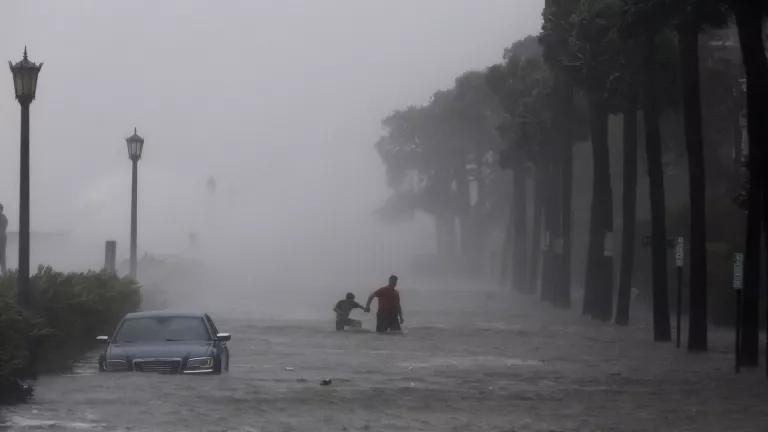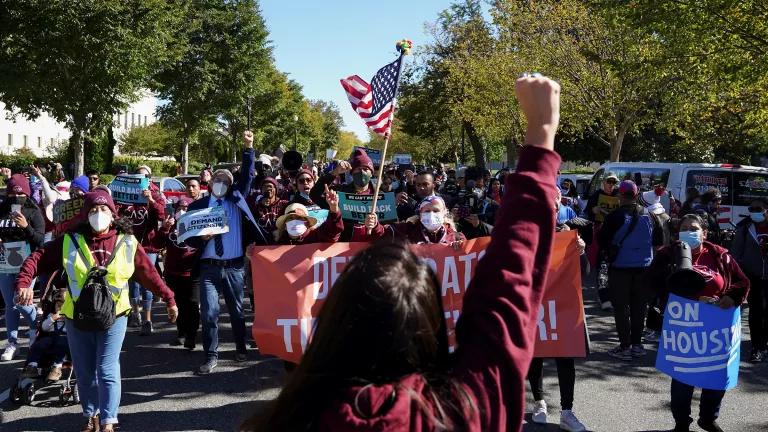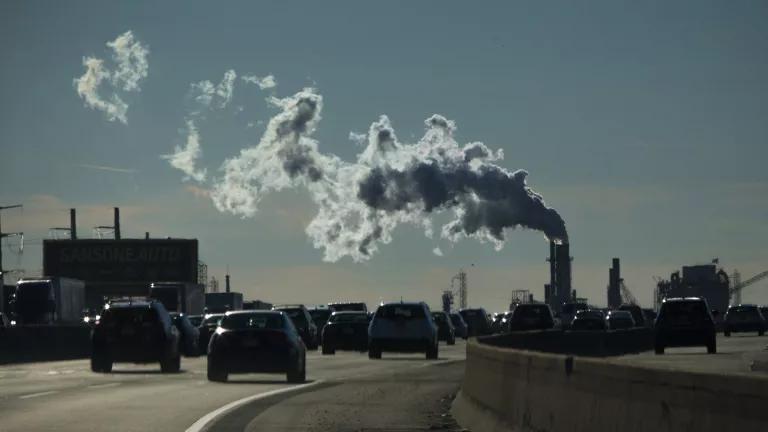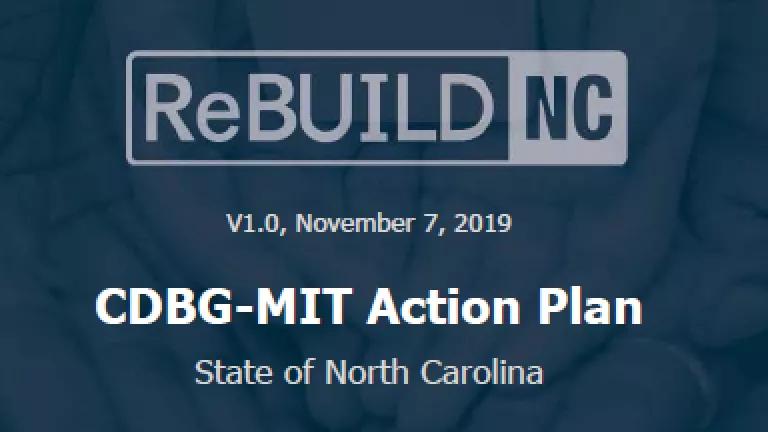The Most Definitive Report on Climate Change in America

The new National Climate Assessment is a dire warning that the devastating impacts of climate change are here—and going to get worse.
The burning of coal, oil, and gas is changing the global climate faster now than at any other time in modern human history, threatening our national security, our economic prosperity, and our children’s future. All this will get worse, perhaps unimaginably so, unless we shift to cleaner, smarter ways to power our future—and do so now, because we’re running out of time.
That’s the conclusion of the new National Climate Assessment, the most definitive report ever compiled on climate change in America. The congressionally mandated quadrennial review pulls together experts from 13 federal agencies to connect the dots between what the science is telling us and what we’re seeing on our TVs, in our newspapers, and out our kitchen windows. “The impacts and costs of climate change are already being felt in the United States,” the report states in sum. “Future risks from climate change depend primarily on decisions made today.”
In little more than a century, the temperature has risen 1.8 degrees Fahrenheit, on average, across the continental United States. That might not sound like much, but it is remaking the map of America and altering the country in ways that touch every aspect of our lives.
Nebraska ranchers, Kansas wheat growers, and Oklahoma farmers are threatened as hotter weather and prolonged drought combine to bake breadbasket croplands; stress cattle, poultry, and hogs; and deplete underground sources of irrigation and drinking water. Wildfires like those that have wiped out entire California communities this year are becoming more devastating across much of the American West as warmer, drier air turns wild places into tinderboxes and extends the range of pests that kill trees by the scores of millions.

Louisiana coastal communities are vanishing in places as rising seas and sinking lands bring ocean waters up to three feet higher than they were three generations ago. In the South Carolina port city of Charleston, high tides alone are enough to flood the streets 50 days out of the year. Rising seas, storm surge, and increased flooding have put more than $1.4 trillion worth of private homes and businesses at growing risk along the nation’s coasts.
From the Great Lakes to the Florida Everglades, warmer weather is teaming up with runoff from cities and farms to create massive toxic outbreaks of algae that kill fish, birds, and other wildlife and make people sick. Disease-spreading ticks and mosquitoes are becoming more prevalent, from the Georgia wetlands to the forests of Vermont. Warming waters are disrupting the catch of lobsters off the coast of Maine, Dungeness crabs off the coast of Washington State and Pacific cod off the coast of Alaska.
In Los Angeles and Cleveland—and dozens of cities in between—warming temperatures are exacerbating the health risks to more than 100 million Americans who live in areas where air pollution exceeds national standards. The Colorado River Basin, and all it supports, are running out of water.
All this, and more, is happening now, as the National Climate Assessment documents.
This is more than a wake-up call—we’re way beyond that. It’s an inventory of the damage we’re already seeing and a partial tally of the price we’re paying for our failure to address the growing dangers of climate change. And, as the report makes clear, unless we take action now to cut the dangerous carbon emissions from burning coal, oil, and gas by replacing those dirty fuels with cleaner, smarter ways to power our future, it will all get worse. How much worse depends entirely on us, and the range of hazard and harm is wide.
“Climate change puts many things Americans care about at risk, both now and in the future, and risks will intensify without action,” the report states. “Many options are available to reduce risks, and choices made today will determine the magnitude of future risks.”
If we dedicate ourselves to phasing down our use of fossil fuels over the next three decades, something we can do with existing technology, we can hold global temperature rise to no more than 3.6 degrees Fahrenheit, or 2 degrees Celsius, above preindustrial levels. If not, the report warns, we could make the planet 9 °F (or more) hotter than it was little more than a century ago, with unimaginable consequences for our world.
Says who? The National Oceanic and Atmospheric Administration, the preeminent authority on what’s happening to our climate. The U.S. Environmental Protection Agency, the guardian of the nation’s environment and health. The National Aeronautics & Space Administration, the folks who put a man on the moon. The Pentagon. The State Department. The National Science Foundation. And seven other federal agencies, all of which have come together to issue the most authoritative report ever on the rising toll climate change is taking on American families and communities.
The National Climate Assessment is the work of more than 300 experts, including scientists from federal agencies, universities, national laboratories, and the private sector. It’s been reviewed by more than 1,000 other stakeholders from the business, scientific, and public interest communities, including a panel from the National Academies of Sciences, Engineering, and Medicine.
Many of the professionals we count on to help us prepare for the future are paying attention, whether they’re analyzing financial markets; making long-term capital investments; developing new standards for engineering, architecture, and urban design; readying our communities for disasters; or buttressing military bases at home and abroad. These experts are looking at what’s happening in our world, evaluating the rising costs of climate change and the growing risks of inaction, and making informed decisions about the way ahead.
But what about the people running the most important organization in the world, the United States government? The first thing the Trump administration did was to move up the report’s scheduled publication by several weeks, so it could release the assessment the day after Thanksgiving, in the hope that few people would be paying attention. To state the obvious: When facing a crisis, hoping people won’t notice is not a winning strategy.
A few days later, though, Trump was asked about the report. “One of the problems that a lot of people like myself, we have very high levels of intelligence, but we’re not necessarily such believers,” he said in an interview with the Washington Post. “There is movement in the atmosphere. There’s no question. As to whether it’s man-made and whether or not the effects that you’re talking about are there, I don’t see it—not nearly like it is.”
At another point in the interview, Trump explained, “I have a gut, and my gut tells me more sometimes than anybody else’s brain can ever tell me.”
That line of thinking never built a car. It never created a smartphone. And it certainly never formed a framework for effective leadership.
The National Climate Assessment hasn’t asked anyone to believe anything. It has tallied much of the toll climate change is already taking on our country and shown how those costs will continue to rise unless we take action now. Trump may as well say he doesn’t believe in the thermometer. It doesn’t change the temperature.
Trump’s stubborn refusal to heed the science and to act on what the experts are telling us matters a great deal. His inaction is an epic betrayal of the country and its people by a president who puts special interests ahead of the national interest.
Propping up the profits of the fossil fuel industry at the expense of our children’s future is a mainstay of Trump’s presidency, part of his rearview-mirror approach to taking the country backward a generation or two. And coal, gas, and oil companies pumped more than $80 million into the midterm congressional elections, with nearly 90 cents on every dollar going to fund Republican candidates, in a trend that goes back decades.
They’re more than getting their money’s worth.
It hasn’t been enough for Trump and his party to pretend it doesn’t matter that seas are rising; glaciers are melting; croplands are turning to desert; storms, floods, and wildfires are raging; and coral reefs are crumbling to sand. They’re working to undo the progress we’ve made, by rolling back measures that cut the carbon pollution from our dirty power plants, trucks, and cars. He’s withdrawn U.S. participation from the landmark 2015 Paris climate agreement, which commits every other country in the world to curb or cut fossil fuel emissions over the coming decades. And they’re waging a full-on attack on the very notion of responsible public oversight of industrial operations, working to repeal, delay, or weaken commonsense safeguards we all rely on to protect our safety, environment, and health.
The National Climate Assessment exposes the deception behind Trump’s agenda and highlights the folly of his campaign to set back U.S. progress fighting climate change, set us apart from global consensus, and set us at odds with basic science.
Far more than that, this report is a letter to our children’s children’s children. It documents, for them as well as for us, what we know is happening, how we can stop it from getting worse, and what’s likely to follow if we fail to act.
From the floods that inundate our coastlines to the droughts that bake our crops, from the fires on the mountains to the coral dying at sea, America itself is telling us every way it can that it’s time to cut the fossil fuel pollution that’s driving global climate change—before it’s too late.
Future generations will know us by how we respond. They’ll know what matters most to us by the actions we take. They’ll know who we really are by the kind of world we leave them.



